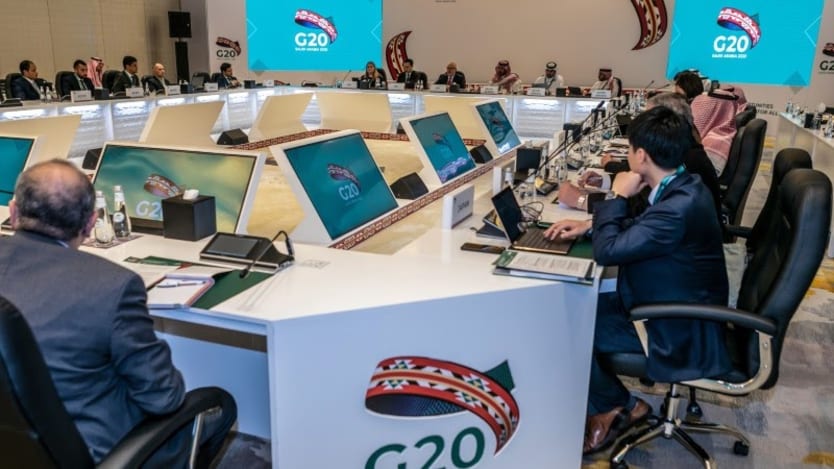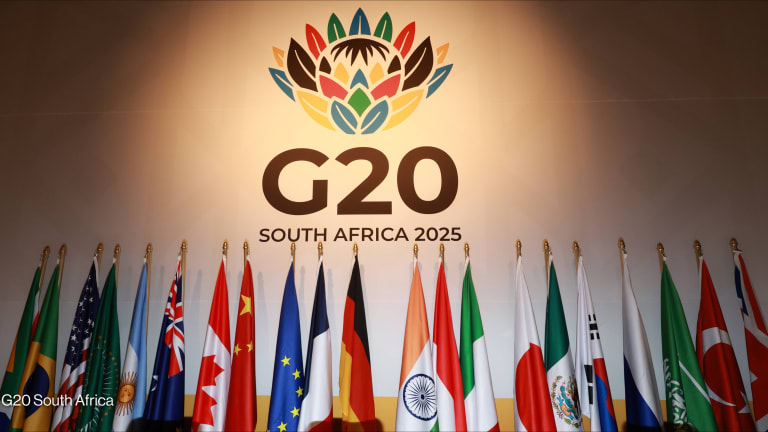
WASHINGTON — The G-20 group of leading economies agreed to a debt framework to help countries pursue debt restructuring or forgiveness, building off of its Debt Service Suspension Initiative and recognizing that some nations may need additional relief, according to a communique released after an extraordinary meeting of G-20 finance ministers and central bank governors Friday.
The framework, which is also agreed to by the Paris Club — the informal group of official creditors who coordinate solutions for debtor countries that have payment difficulties — is intended to “facilitate timely and orderly debt treatment for DSSI-eligible countries, with broad creditors’ participation including the private sector,” according to the communique.
Countries that need some form of debt treatment must start the process by making a request from their creditors. The need for debt relief will be based on an International Monetary Fund-World Bank Group debt sustainability analysis, and the assessment of the creditors and all public debt with at least a one-year maturity period will be eligible.
“It’s too early to know how [the debt treatment is] … going to work because the big issue on the table too is what happens with private creditors.”
— Jaime Atienza, debt policy lead, OxfamThere is still some ambiguity in how the process will play out, but the communique said that key parameters will ensure fair burden-sharing among creditors and that a debtor country signing a memorandum of understanding with creditors that are part of the framework will be required to seek similar relief from all of its other creditors.
“There is no doubt this is incredible progress,” said Eric LeCompte, executive director of Jubilee USA Network. “This process is a step forward that includes more actors and will expedite relief and reduction.”
In the past, the Paris Club has tried to bring newer creditor countries, including China, Saudi Arabia, India, and others, to the table but has not been successful. This framework essentially brings those actors together to more broadly coordinate debt, said Jaime Atienza, debt policy lead at Oxfam.
Development experts have a number of concerns about the process, though, including whether there will be more of a focus on restructuring rather than reducing debt, a lack of stronger private sector participation, and the fact that it does not apply to middle-income countries facing debt distress.
“It’s too early to know how it’s going to work because the big issue on the table too is what happens with private creditors,” Atienza told Devex. While countries seeking public debt relief must also reach out to private creditors as part of the process in the framework and the private sector is encouraged to provide comparable treatment, the mechanism to include them does not seem very strong, Atienza said.
Is Zambia's debt default a sign of things to come?
Experts say Zambia's default will further stifle the country's development, offering a cautionary tale for other debt distressed economies.
The G-20 should consider possible enhancements to encourage the participation of private creditors, which need to be a part of debt reduction efforts, World Bank Group Chief Economist Carmen Reinhart told the meeting, according to a statement. G-20 governments can also adopt legislation that would expedite a debt restructuring process and should consider incentives for all public creditor institutions to fully participate so there is equity among creditors, she said.
Reinhart also called on lower-income countries to put in place sustainable national policies that support the poor and said greater transparency is needed.
“We urge all G-20 countries to require their public creditor institutions to disclose debt contracts, as well as DSSI MOUs, and make refinancing agreements public,” she said, adding that the World Bank Group will continue its work to improve debt data quality and disclosures.
The main issue that Atienza took issue with in the framework is that countries have to initiate the process, which is likely to lead them to the brink of default before they seek action and could damage their borrowing ability, he said. He had hoped to see a framework that established thresholds for restructuring that would allow countries to seek help more preventively, Atienza said.
Another concern is that the framework only applies to DSSI countries, leaving out middle-income countries, which in some cases are also facing significant debt burdens, LeCompte said, adding that he hopes the agreement could potentially be expanded to a broader group of countries down the road.
Overall, though, there seems to be a consensus that the new framework is a step in the right direction and critically includes China — though the country is likely to need to change some domestic laws to allow it to participate, which is referenced in the communique.
In the case of a debt write-off or cancellation, “specific consideration will be given to the fact that each participating creditor shall fulfill its domestic approval procedures in a timely manner while keeping other creditors informed of progress,” the communique said.
When the G20 Leaders’ Summit takes place this month, the debt framework is likely to be part of a broader communique and will likely be highlighted by leaders, LeCompte said.
Search for articles
Most Read
- 1
- 2
- 3
- 4
- 5








